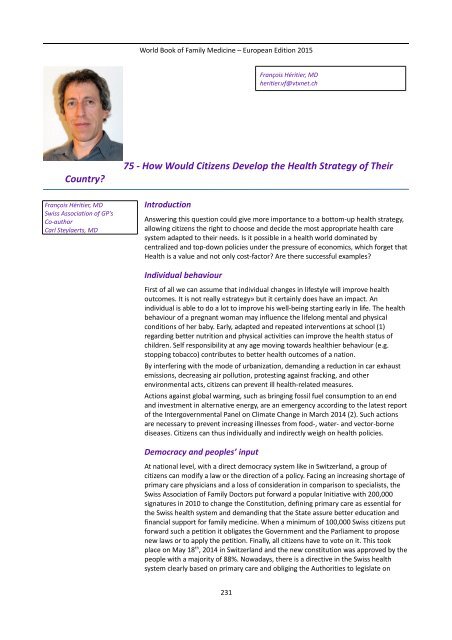Family Medicine
World Book 2015
World Book 2015
You also want an ePaper? Increase the reach of your titles
YUMPU automatically turns print PDFs into web optimized ePapers that Google loves.
World Book of <strong>Family</strong> <strong>Medicine</strong> – European Edition 2015<br />
François Héritier, MD<br />
heritier.vf@vtxnet.ch<br />
Country?<br />
François Héritier, MD<br />
Swiss Association of GP’s<br />
Co-author<br />
Carl Steylaerts, MD<br />
75 - How Would Citizens Develop the Health Strategy of Their<br />
Introduction<br />
Answering this question could give more importance to a bottom-up health strategy,<br />
allowing citizens the right to choose and decide the most appropriate health care<br />
system adapted to their needs. Is it possible in a health world dominated by<br />
centralized and top-down policies under the pressure of economics, which forget that<br />
Health is a value and not only cost-factor? Are there successful examples?<br />
Individual behaviour<br />
First of all we can assume that individual changes in lifestyle will improve health<br />
outcomes. It is not really «strategy» but it certainly does have an impact. An<br />
individual is able to do a lot to improve his well-being starting early in life. The health<br />
behaviour of a pregnant woman may influence the lifelong mental and physical<br />
conditions of her baby. Early, adapted and repeated interventions at school (1)<br />
regarding better nutrition and physical activities can improve the health status of<br />
children. Self responsibility at any age moving towards healthier behaviour (e.g.<br />
stopping tobacco) contributes to better health outcomes of a nation.<br />
By interfering with the mode of urbanization, demanding a reduction in car exhaust<br />
emissions, decreasing air pollution, protesting against fracking, and other<br />
environmental acts, citizens can prevent ill health-related measures.<br />
Actions against global warming, such as bringing fossil fuel consumption to an end<br />
and investment in alternative energy, are an emergency according to the latest report<br />
of the Intergovernmental Panel on Climate Change in March 2014 (2). Such actions<br />
are necessary to prevent increasing illnesses from food-, water- and vector-borne<br />
diseases. Citizens can thus individually and indirectly weigh on health policies.<br />
Democracy and peoples’ input<br />
At national level, with a direct democracy system like in Switzerland, a group of<br />
citizens can modify a law or the direction of a policy. Facing an increasing shortage of<br />
primary care physicians and a loss of consideration in comparison to specialists, the<br />
Swiss Association of <strong>Family</strong> Doctors put forward a popular Initiative with 200,000<br />
signatures in 2010 to change the Constitution, defining primary care as essential for<br />
the Swiss health system and demanding that the State assure better education and<br />
financial support for family medicine. When a minimum of 100,000 Swiss citizens put<br />
forward such a petition it obligates the Government and the Parliament to propose<br />
new laws or to apply the petition. Finally, all citizens have to vote on it. This took<br />
place on May 18 th , 2014 in Switzerland and the new constitution was approved by the<br />
people with a majority of 88%. Nowadays, there is a directive in the Swiss health<br />
system clearly based on primary care and obliging the Authorities to legislate on<br />
231


